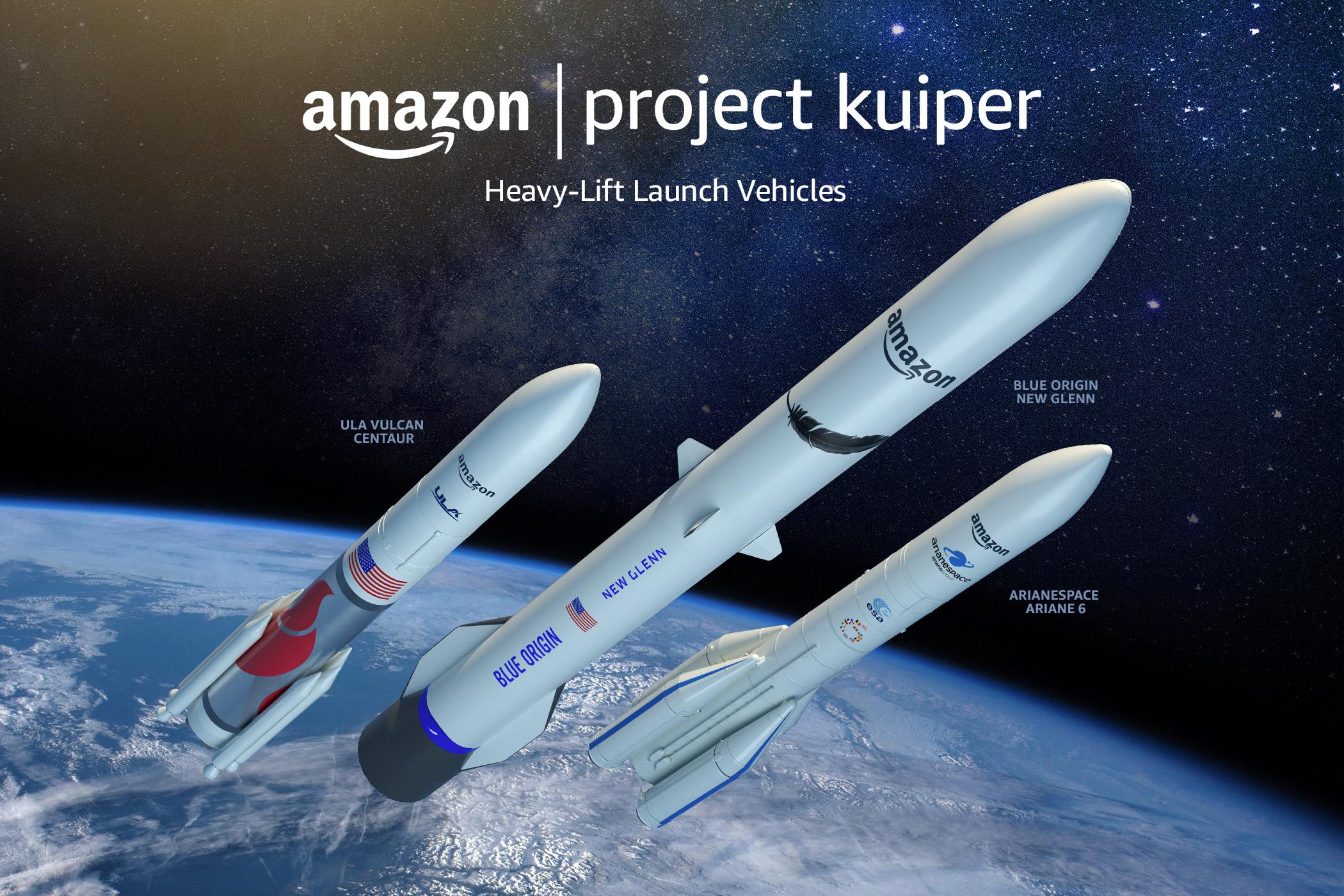
COLORADO SPRINGS—Amazon has signed contracts for a fleet of up to 83 heavy-lift launchers owned and operated by Arianespace, Blue Origin and United Launch Alliance (ULA) to deliver the bulk of its planned 3,236-member Kuiper broadband satellite constellation into orbit.
The launches, which were announced April 5 at the Space Symposium here, are intended to take place within a five-year period, though Amazon declined to say when the campaign would begin. Amazon plans to launch two prototype missions later this year on the ABL Space Systems’ RS1 small satellite launcher.
In terms of the number of launches, the lion’s share went to ULA, which is developing the Vulcan heavy-lift rocket to replace its current Atlas V and Delta IV Heavy vehicles. Amazon’s agreement with ULA cover 38 Vulcan launches, as well as infrastructure upgrades, including a new Vulcan launch platform, to support an increased flight rate at Cape Canaveral Space Force Station in Florida. Amazon previously signed a contract with ULA for nine Kuiper launches on Atlas V rockets.
ULA is making additional investments in its Spaceflight Processing & Operations Center (SPOC) to deliver a second ULA facility capable of full vehicle processing, transforming the launch site to have two parallel “launch lanes” for high-cadence operations.
“With a total of 47 launches between our Atlas and Vulcan vehicles, we are proud to launch the majority of this important constellation,” ULA president and CEO Tory Bruno said in a statement. “It will support hundreds of jobs, especially in places like Alabama, Colorado and Florida, and Amazon’s investments in launch infrastructure and capability upgrades will benefit both commercial and government customers.”
Another 18 launches will take place aboard Arianespace’s new Ariane 6 rocket, which also is nearing its debut flight. “That Amazon has chosen the Ariane 6 … is a matter of tremendous pride for us and a great vote of confidence in our new launch vehicle,” Arianespace CEO Stephane Israel said in a statement. “It is a major win for the European launcher industry.”
Rounding out the awards is a 12-launch contract with Blue Origin, which is developing a reusable system that includes a 23-ft. diameter payload fairing—larger than anything currently flying. Amazon’s contract with Blue Origin—a sister company founded by Jeff Bezos—includes options for up to 15 additional Kuiper missions on New Glenn, which is slated for a flight test in 2023.
“These launch agreements reflect our incredible commitment and belief in Project Kuiper,” Dave Limp, senior vice president for Amazon Devices & Services, said in a statement. “We’re proud to be working with such an impressive lineup of partners to deliver on our mission.”
Terms of the contracts—the largest commercial procurement of launch vehicles in history—were not disclosed.
Buying rides with multiple providers “reduces risk associated with launch vehicle stand-downs and supports competitive long-term pricing for Amazon—producing cost savings that we can pass on to our customers,” said Rajeev Badyal, Project Kuiper’s vice president of technology. “These large, heavy-lift rockets also mean we can deploy more of our constellation with fewer launches, helping simplify our launch and deployment schedule.”
Left out of the initial procurement was SpaceX. “We’ve talked to every major launch provider, and we’ll continue to explore all of our options for future launch services,” an Amazon spokesperson wrote in an email to Aerospace DAILY. “These three launch vehicles offered the right combination of capacity, performance, and cost to meet our needs.”
Similar to OneWeb, SpaceX’s Starlink, Telesat’s Lightspeed and other projects, Amazon’s Kuiper is designed to provide high-speed, low-latency broadband services from a constellation of satellites in low Earth orbit. The company plans to sell Kuiper services to a wide array of residential, business and government customers in places without reliable internet service.
The system is designed to operate with small, low-cost customer terminals. “Project Kuiper will leverage Amazon’s global logistics and operations footprint—as well as Amazon Web Services’ networking and infrastructure—to serve a diverse, global customer base,” the company said.
In addition to the launch contracts, Amazon announced a partnership agreement with Beyond Gravity (formerly RUAG Space) to design and manufacture a flexible, scalable satellite dispenser system suitable for a variety of rockets and payload configurations. Beyond Gravity in March broke ground on a new manufacturing facility in Linköping, Sweden, that will double the company’s dispenser production capability. The new facility, which is a partnership between Beyond Gravity, the Swedish Space Agency and the city of Linköping, is expected to be completed by 2023.





